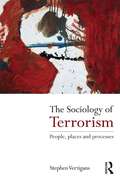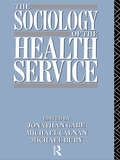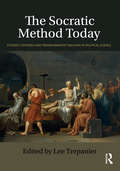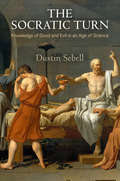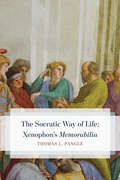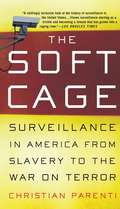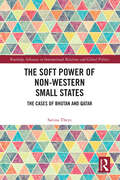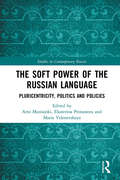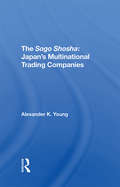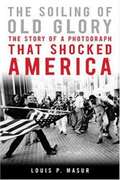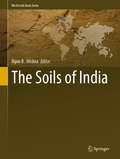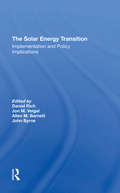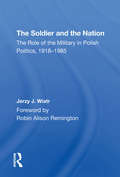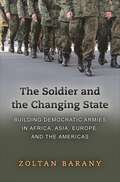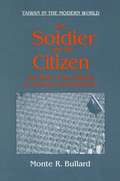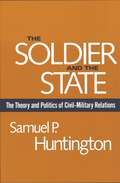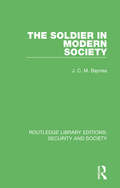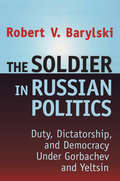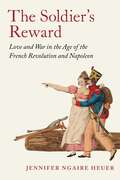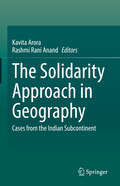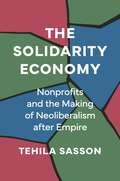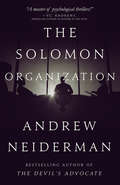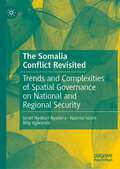- Table View
- List View
The Sociology of Terrorism: People, Places and Processes
by Stephen VertigansThis is the first terrorism textbook based on sociological research. It adopts an innovative framework that draws together historical and modern, local and global, and social processes for a range of individuals, groups and societies. Individual behaviour and dispositions are embedded within these broader relationships and activities, allowing a more holistic account of terrorism to emerge. In addition, the shifting forms of identification and interwoven attitudes to political violence are discussed in order to explain the emergence, continuation, and end of ‘terrorist’ careers. The book draws on examples from across the discursive spectrum, including religious, ‘red’ and ‘black’ racialist, nationalist, and trans-national. It also spans territories as diverse as Chechnya, Germany, Italy, Japan, Northern Ireland, Pakistan, Palestine, Saudi Arabia, South America, the UK, and the US.
The Sociology of the Health Service
by Michael Bury Jonathan Gabe Michael CalnanThe Sociology of the Health Service responds directly to the need to develop a sociological analysis of current health policy. Topics covered vary from privatisation and health service management to health education and the politics of professional power. Also included is an histroical review of sociology's contributions to health policy and proposals for an agenda for sociological health policy research in the 1990s.
The Socratic Method Today: Student-Centered and Transformative Teaching in Political Science
by Lee TrepanierThis exciting new textbook provides a sophisticated examination of the Socratic method for teaching political science students in higher education. It shows how the Socratic method is employed in the Platonic dialogs, compares its transformative approach to other student-centered teaching philosophies, and addresses the challenges of adopting the Socratic method in the contemporary classroom. The book is divided into three sections that integrate these practical aspects on the Socratic method with the theoretical considerations of Socratic philosophy while also addressing contemporary concerns about teaching and learning in higher education. Section One explores how the Socratic method is portrayed by Socrates in Plato’s dialogs. Section Two compares the Socratic method with modern and contemporary accounts of teaching and learning. Section Three examines some of the contemporary challenges of practicing the Socratic method in the university classroom today and how teachers can overcome them. Written in a clear and engaging style, this timely intervention is essential reading for upper undergraduate students enrolled in courses that specialize in pedagogical techniques, political theory, Socratic philosophy, and law.
The Socratic Turn
by Dustin SebellThe Socratic Turn addresses the question of whether we can acquire genuine knowledge of good and evil, right and wrong. Reputedly, Socrates was the first philosopher to make the attempt. But Socrates was a materialistic natural scientist in his youth, and it was only much later in life--after he had rejected materialistic natural science--that he finally turned, around the age of forty, to the examination of ordinary moral and political opinions, or to moral-political philosophy so understood.Through a consideration of Plato's account of Socrates' intellectual development, and with a view to relevant works of the pre-Socratics, Xenophon, Aristotle, Hesiod, Homer, and Aristophanes, Dustin Sebell reproduces the course of thought that carried Socrates from materialistic natural science to moral-political philosophy. By doing so, he seeks to recover an all but forgotten approach to the question of justice, one still worthy of being called scientific.
The Socratic Way of Life: Xenophon’s “Memorabilia”
by Thomas L. PangleThe Socratic Way of Life is the first English-language book-length study of the philosopher Xenophon’s masterwork. In it, Thomas L. Pangle shows that Xenophon depicts more authentically than does Plato the true teachings and way of life of the citizen philosopher Socrates, founder of political philosophy. In the first part of the book, Pangle analyzes Xenophon’s defense of Socrates against the two charges of injustice upon which he was convicted by democratic Athens: impiety and corruption of the youth. In the second part, Pangle analyzes Xenophon’s account of how Socrates’s life as a whole was just, in the sense of helping through his teaching a wide range of people. Socrates taught by never ceasing to raise, and to progress in answering, the fundamental and enduring civic questions: what is pious and impious, noble and ignoble, just and unjust, genuine statesmanship and genuine citizenship. Inspired by Hegel’s and Nietzsche’s assessments of Xenophon as the true voice of Socrates, The Socratic Way of Life establishes the Memorabilia as the groundwork of all subsequent political philosophy.
The Soft Cage: Surveillance in America From Slavery to the War on Terror
by Christian ParentiOn a typical day, you might make a call on a cell phone, withdraw money at an ATM, visit the mall, and make a purchase with a credit card. Each of these routine transactions leaves a digital trail for government agencies and businesses to access. As cutting-edge historian and journalist Christian Parenti points out, these everyday intrusions on privacy, while harmless in themselves, are part of a relentless (and clandestine) expansion of routine surveillance in American life over the last two centuries-from controlling slaves in the old South to implementing early criminal justice and tracking immigrants. Parenti explores the role computers are playing in creating a whole new world of seemingly benign technologies-such as credit cards, website "cookies," and electronic toll collection-that have expanded this trend in the twenty-first century. The Soft Cage offers a compelling, vitally important history lesson for every American concerned about the expansion of surveillance into our public and private lives.
The Soft Power of Non-Western Small States: The Cases of Bhutan and Qatar (ISSN)
by Sarina TheysThis book critically engages with the concepts of small states and soft power and advances a new approach to defining small states, a new conceptualisation of soft power, and a method for empirically analysing the exercise of soft power. It revisits the concepts of small states and soft power with a focus on Bhutan and Qatar and their approach to exercise soft power to achieve their foreign policy goals.Building on two main perspectives to define small states – the objective approach and the subjective perspective – this book offers an intersubjective approach to define states as small. The intersubjective approach requires a shared understanding between states that a certain state is small. The book further highlights the importance of deconstructing the meaning of size and to separate the notion of size from the concept of power because size is not always indicative of power. It argues that although small states tend to have fewer material resources than large states, they nevertheless can have influence through the exercise of soft power. Soft power is in this book defined as the ability of an actor to convince another actor that something is true. Convincing deals with the beliefs of an actor and is a mental decision rather than a physical action. This book argues that the exercise of soft power can be analysed through examining the development, projection, and reception of identities. The findings of this book show that Bhutan was more successful than Qatar in exercising soft power and explains the reasons for this variation.Aimed at a multidisciplinary audience, this book will be of particular interest to practitioners, scholars, and students of International Relations, Political Power, Small States, and Area Studies.
The Soft Power of the Russian Language: Pluricentricity, Politics and Policies (Studies in Contemporary Russia)
by Maria Yelenevskaya Arto Mustajoki Ekaterina ProtassovaExploring Russian as a pluricentric language, this book provides a panoramic view of its use within and outside the nation and discusses the connections between language, politics, ideologies, and cultural contacts. Russian is widely used across the former Soviet republics and in the diaspora, but speakers outside Russia deviate from the metropolis in their use of the language and their attitudes towards it. Using country case studies from across the former Soviet Union and beyond, the contributors analyze the unifying role of the Russian language for developing transnational connections and show its value in the knowledge economy. They demonstrate that centrifugal developments of Russian and its pluricentricity are grounded in the language and education policies of their host countries, as well as the goals and functions of cultural institutions, such as schools, media, travel agencies, and others created by émigrés for their co-ethnics. This book also reveals the tensions between Russia’s attempts to homogenize the 'Russian world' and the divergence of regional versions of Russian reflecting cultural hybridity of the diaspora. Interdisciplinary in its approach, this book will prove useful to researchers of Russian and post-Soviet politics, Russian studies, Russian language and culture, linguistics, and immigration studies. Those studying multilingualism and heritage language teaching may also find it interesting.
The Sogo Shosha: Japan's Multinational Trading Companies
by Alexander YoungThe sogo shosha, Japan's general trading companies, are regarded as a key element in the country's rapid economic growth after World War II and its great success in international trade. In Japanese fiscal year 1975, the ten largest sogo shosha had total sales of $155 billion, accounting for 56 percent of Japan's exports and imports, 18 percent of domestic wholesale trade, and 31 percent of GNP. On the international level, the transactions of these companies in the same year were 5 percent of world export trade. This book—the first comprehensive, English-language work on the sogo shosha—systematically describes and analyzes the basic characteristics, business methods, sales and profit trends, strategies, national roles, global reach, strengths and weaknesses, and future prospects of these global trading conglomerates. In examining both the national and the global facets of the sogo shosha, the author presents the economic and social origins of the ten largest companies, how they differ from the pre-World War II zaibatsu, and how they resemble and differ from Western multinational corporations. A wealth of statistical and tabular material supplements his account of the sogo shosha as Japan's chief importers of foodstuffs, raw materials, and equipment; as the advance guard of Japanese exports; as a driving force to rationalize the domestic distribution system; and as investor-organizers of multinational overseas natural resource development programs.
The Soiling of Old Glory: The Story of a Photograph That Shocked America
by Louis P. MasurSometimes a moment can change history. This one took 1/250th of a second. The photograph strikes us with visceral force, even years after the instant it captured. A white man, rage written on his face, lunges to spear a black man who is being held by another white. The assailant's weapon is the American flag. Boston, April 5, 1976: As the city simmered with racial tension over forced school busing, newsman Stanley Forman hurried to City Hall to photograph that day's protest, arriving just in time to snap the image that his editor would title "The Soiling of Old Glory. " The photo made headlines across the U. S. and won Forman his second Pulitzer Prize. It shocked Boston, and America: Racial strife had not only not ended with the 1960s, it was alive and well in the cradle of liberty. Louis P. Masur's evocative "biography of a photograph" unpacks this arresting image in a tour de force of historical writing. He examines the power of photography and the meaning of the flag, asking why this one picture had so much impact. Most poignantly, Masur recreates the moment and its aftermath, drawing on extensive interviews with Forman and the figures in the photo to reveal not just how the incident happened, but how it changed the lives of the men in it. The Soiling of Old Glory, like the photograph it is named for, offers a dramatic window onto the turbulence of the 1970s and race relations in America.
The Soils of India (World Soils Book Series)
by Bipin B. MishraThis book provides an overview of the diversified soil regimes in India. In addition to the historical advances in soil research and its limitations, it describes the monitoring of various soil conditions and soil uses to improve productivity. Discussing topics such as climate, geology and geomorphology, major soil types and their classification, soil mineralogy and clays, soil micromorphology, soil biogeochemistry, benchmark soils, land evaluation and land use planning, soil health and fertility and soil resilience, the book highlights the multiple uses of soils in industry, human health care, mitigation of challenges due to climate change and construction. It also presents measures for a brighter future of soil science in India, such as imposing organic farming principles toward sustainable agriculture in the context of the second green revolution besides alleviating the poverty and providing the employment opportunities among the farming communities in India.
The Solar Energy Transition: Implementation And Policy Implications
by John Byrne Jon M Veigel Daniel Rich Allen M BarnettSolar energy is considered by many an attractive and practical option for America's energy future, one that is technically and commercially feasible as well as socially and environmentally desirable. Sun-generated power could meet upwards of 20 percent of U.S. energy needs by the year 2000—but only if there is a concerted national effort to use this energy option. The issues of implementation and the public and private initiatives needed to facilitate a transition to extensive use of solar energy are the focus of this volume. The solar transition is addressed from the diverse perspectives of the many necessary participants: industries and small businesses; local, state, regional, and federal governments; public utilities; policy analysts; and solar advocates. The contributors assess the extent to which solar alternatives can replace and augment other energy forms, the pace and pattern for solar commercialization, and the roles of public and private institutions in carrying out the transition. A consensus becomes apparent: Although the transition to solar energy is technically and commercially viable, its success depends on concerted public and private efforts to promote innovation and diversification in energy production and distribution and to institute major changes in public policy related to energy use.
The Soldier And The Nation: The Role Of The Military In Polish Politics, 1918-1985
by Jerzy J WiatrJerzy J. Wiatr's book, The Soldier and the Nation: The Role of theMilitary in Polish Politics, 1918-1985, will undoubtedly be controversial. It is the interpretation of an insider whose uncle was a Polish general, who worked as a civilian sociologist at the Military Political College in Warsaw in the 1950s, and who is thoroughly familiar with the
The Soldier and the Changing State: Building Democratic Armies in Africa, Asia, Europe, and the Americas
by Zoltan BaranyThe Soldier and the Changing State is the first book to systematically explore, on a global scale, civil-military relations in democratizing and changing states. Looking at how armies supportive of democracy are built, Zoltan Barany argues that the military is the most important institution that states maintain, for without military elites who support democratic governance, democracy cannot be consolidated. Barany also demonstrates that building democratic armies is the quintessential task of newly democratizing regimes. But how do democratic armies come about? What conditions encourage or impede democratic civil-military relations? And how can the state ensure the allegiance of its soldiers? Barany examines the experiences of developing countries and the armed forces in the context of major political change in six specific settings: in the wake of war and civil war, after military and communist regimes, and following colonialism and unification/apartheid. He evaluates the army-building and democratization experiences of twenty-seven countries and explains which predemocratic settings are most conducive to creating a military that will support democracy. Highlighting important factors and suggesting which reforms can be expected to work and fail in different environments, he offers practical policy recommendations to state-builders and democratizers.
The Soldier and the Citizen: Role of the Military in Taiwan's Development (Taiwan In The Modern World Ser.)
by Monte R. BullardA soldier-citizen describes the role of the Republic of China's military in the political socialization of Taiwan's citizens during the first two decades after the loss of the Chinese mainland.
The Soldier and the State in India
by Ayesha RayThe Soldier and the State in India is one of the first attempts at offering a theoretical perspective for examining some of the most critical issues that have emerged in Indian civil-military relations. It specifically examines issues pertaining to military expertise and military professionalism that emerged whenever there was a contestation in civil-military functions, thereby allowing the military greater influence in policy-making. The book uses Samuel Huntington's ideas on military professionalism and Peter Feaver's discussion of military expertise in the American context as the theoretical framework for addressing similar issues that have emerged in debates on Indian civil-military relations. Moreover, it also includes a serious focus on the role of the Indian military in counterinsurgency operations and the impact of Indian nuclear strategy on the relationship between civilians and the military in India. Most books on the subject have failed to address issues that emerge when there is a contestation in civil-military functions; this book seeks to fill that gap.
The Soldier and the State: The Theory and Politics of Civil–Military Relations
by Samuel P. HuntingtonIn this classic work, Huntington challenges old assumptions and ideas on the role of the military in society. Stressing the value of the military outlook for American national policy, Huntington has performed the distinctive task of developing a general theory of civil–military relations and subjecting it to rigorous historical analysis.
The Soldier in Modern Society (Routledge Library Editions: Security and Society)
by J. C. BaynesDuring the few years prior to publication there had been a growing interest not only in the organisation and efficiency of the British Army, but also in its role in modern British society and the place of soldiering as a significant career. The time was therefore ripe for a book such as this, which looks objectively at the position of our Army whilst at the same time showing the actual experience of a Regular soldier. Originally published in 1972, Colonel Baynes’s book was largely written during a year’s Defence Fellowship at Edinburgh University in 1968-9, where he worked under Professor John Erickson in the Higher Defence Studies sections of the Department of Politics. He begins by examining the ways in which armies can be used, and then turns to more specific issues connected with the employment of the British Army in the modern world. He summarises what the British Army has accomplished since 1945 and how its strength has varied, and follows with a chapter on the cost of maintaining it. The core of the book revolves around three basic questions. First, what, in the 1970s, does British society really think about its Army, and what sort of army does it want? Second, how can soldiers be kept keen and efficient in a period of prolonged peace? And third, who will join the Army in the coming years, what will their conditions of service be like and what are their career opportunities? Some of Colonel Baynes’s solutions to these problems are likely to be unpopular with traditionalists, although he is by no means an iconoclast and has a deep affection for, and belief in, his own profession. At the time this book was strongly recommended to all with an interest in the security of this country and the future of its armed forces: both those serving in them and civilians.
The Soldier in Russian Politics, 1985-96
by Robert BarylskiIf Russia is to become a viable democracy, it will need a viable state to make and enforce decisions that nurture societal cohesion and sustain complex economic activity. Armed forces are essential attributes of viable modern states, but what happens when states undergo major structural changes? What was the military's contribution to the end of the Soviet Union and the rise of post-Soviet Russia?The Soldier in Russian Politics is the first study to go beyond familiar accounts of the main events that brought down the Soviet state and began its reconstruction. It captures the interplay between soldier and civilian politicians in a major political history based on solid political-sociological analysis. Barylski uses the study of civil-military relations to explore new political and intellectual conditions and explain the historic relationship between changes in Western models of Russian reality and political change in the former Soviet Union.Examining the military's participation in every major, twentieth-century, political change from 1917 to 1991, Barylski demonstrates that every deep political transformation in Russia has military dimensions. Barylski discusses how the Russian presidency's power to command and control the military without legislative checks and balances led to armed conflict with Parliament in October 1993 and to the Chechen war of 1994-1996, and is unhealthy for long term democratic development. Barylski analyzes ministers of defense Yazov, Shaposhnikov, Grachev, and Rodionov as political actors, traces the careers of ambitious political soldiers such as Aleksandr Lebed and Aleksandr Rutskoi, and describes the military's growing political alienation from the Yeltsin administration. His final chapters cover the presidential elections, the short-lived Yeltsin-Lebed political alliance, the tensions associated with Yeltsin's ailments, and Yeltsin's efforts to rebuild his personal power political effectiveness.The Soldier in Russian Politics presents political history in an incisive and objective manner. It applauds the progressive officers, soldiers, and politicians where decisions minimized bloodshed and prevented civil war. But it also warns that civilian and military leaders can make mistakes which cause political institutional failure, violence, and dictatorship. This book will interest political scientists, political sociologists, students of Russian and soviet politics, and all military historians and professionals.
The Soldier's Reward: Love and War in the Age of the French Revolution and Napoleon
by Jennifer Ngaire HeuerA sweeping history of intimacy and family life in France during the age of revolutionThe French Revolution and Napoleonic Wars devastated Europe for nearly a quarter of a century. The Soldier&’s Reward recovers the stories of soldiers and their relationships to family and domestic life during this period, revealing how prolonged warfare transformed family and gender dynamics and gave rise to new kinds of citizenship.In this groundbreaking work combining social, cultural, gender, and military history, Jennifer Ngaire Heuer vividly describes how men fought for years with only fleeting moments of peace. Combatants were promised promotion, financial gain, and patriotic glory. They were also rewarded for their service by being allowed to return home to waiting families and love interests, and with marriages that were arranged and financially supported by the state. Heuer explores competing ideas of masculinity in France, as well as the experiences of the men and women who participated in such marriages. She argues that we cannot fully understand the changing nature of war and peace in this period without considering the important roles played by family, gender, and romantic entanglements.Casting new light on a turbulent era of mass mobilization and seemingly endless conflict, The Soldier&’s Reward shows how, from the Revolution through the Restoration, war, intimacy, and citizenship intersected in France in new and unexpected ways.
The Solidarity Approach in Geography: Cases from the Indian Subcontinent
by Kavita Arora Rashmi Rani AnandThis contributed volume explains the concept of solidarity and illustrates how perspectives informed by a solidarity approach can be utilized in geographic research. Geography offers a set of concepts and tools including space, place, scale, landscape, and mobility, that makes it a particularly useful lens through which to view issues of solidarity. It is distinct from other sciences in its subject matter and methodology but at the same time offers a multidisciplinary approach and transcends its disciplinary boundary. The concept of solidarity in geography is illustrated here through nearly thirty-five case chapters, all from the Indian subcontinent. Topics covered here include but are not limited to geographical approaches to solidarity in economic issues, indigenous knowledge, international relations, global geopolitics, climate change, crisis management, human health, and more.
The Solidarity Economy (Diverse Economies and Livable Worlds)
by Jean-Louis LavilleQuestioning the boundaries between politics and economics Jean-Louis Laville&’s large body of work has focused on an intellectual history of the concept of solidarity since the Industrial Revolution. In The Solidarity Economy, his most famous distillation of this work, Laville establishes how the formations of economic solidarities (unions, activism, and other forms of associationalism) reveal that the boundaries between politics and economics are porous and structured such that politics, ideally a pure expression of ethics and values, is instead integrated with economic concerns. Exploring the possibilities and long histories of association, The Solidarity Economy identifies the power of contemporary social and solidarity movements and examines the history of postcapitalist practices in which democratic demands invade the heart of the economy. The Solidarity Economy ranges in focus from workers associations in France dating back to the nineteenth century, to associations of African Americans and feminists in the United States in the late nineteenth and early twentieth centuries, to a Brazilian landless-worker coalition in the twentieth century. Studying solidarity associations over time allows us to examine how we can recombine the economic and political spheres to address dependencies and inequalities. Ultimately, The Solidarity Economy has global scope and inspiring examples of associations that deepen democracy.
The Solidarity Economy: Nonprofits and the Making of Neoliberalism after Empire
by Tehila SassonThe untold story of the role of humanitarian NGOs in building the neoliberal order after empireAfter India gained independence in 1947, Britain reinvented its role in the global economy through nongovernmental aid organizations. Utilizing existing imperial networks and colonial bureaucracy, the nonprofit sector sought an ethical capitalism, one that would equalize relationships between British consumers and Third World producers as the age of empire was ending. The Solidarity Economy examines the role of nonstate actors in the major transformations of the world economy in the postwar era, showing how British NGOs charted a path to neoliberalism in their pursuit of ethical markets.Between the 1950s and 1990s, nonprofits sought to establish an alternative to Keynesianism through their welfare and development programs. Encouraging the fair trade of commodities and goods through microfinance, consumer boycotts, and corporate social responsibility, these programs emphasized decentralization, privatization, and entrepreneurship. Tehila Sasson tells the stories of the activists, economists, politicians, and businessmen who reimagined the marketplace as a workshop for global reform. She reveals how their ideas, though commonly associated with conservative neoliberal policies, were part of a nonprofit-driven endeavor by the liberal left to envision markets as autonomous and humanizing spaces, facilitating ethical relationships beyond the impersonal realm of the state.Drawing on dozens of newly available repositories from nongovernmental, international, national, and business archives, The Solidarity Economy reconstructs the political economy of these markets—from handicrafts and sugar to tea and coffee—shedding critical light on the postimperial origins of neoliberalism.
The Solomon Organization
by Andrew NeidermanFrom the bestselling author of The Devil’s Advocate comes this “fast-moving thriller with an up-to-the-minute premise: a secret conspiracy of men” (Publishers Weekly). Scott Lester’s bitter divorce includes accusations of adultery, alcoholism, and more—and they’re all true. To keep from losing his five-year-old daughter forever, he turns to the Solomon Organization, a secret society sympathetic to the plight of men in Scott’s situation. They are on his side. They will help him. And they don’t even want his money—they only want what is best for his little girl. And what they decide is best is the worst thing Scott Lester can imagine . . . “A taut tale of horror made more horrible by its very plausibility.” —Library Journal
The Somalia Conflict Revisited: Trends and Complexities of Spatial Governance on National and Regional Security
by Nazmul Islam Israel Nyaburi Nyadera Billy AgwandaThis book aims to examine how informality of spatial governance has influenced the evolution of the conflict in Somalia and the region. It not only reopens the debate over how the irregular conflicts can transcend national boundaries, but also presents the complexities of spatial governance on national and regional security. The book examines how socio-political and identity bonds play out in spatial governance sometimes resulting to informal control of vast national territories. The book argues that such informally governed spaces increase the level of security threat vulnerability at the national and regional levels. The book therefore adds to the existing literature which has not only to be dominated by discourses on the impact of identity on the conflict but also fall short of connecting the impact of informal spatial governance on security. Examining how informality in governance in one country can impact on the security of an entire region is a key consideration in emerging peacebuilding strategies.
